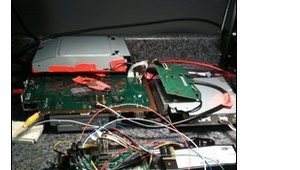
A California judge has granted Sony a temporary restraining order against George Hotz, who—in addition to famously jailbreaking the Apple iPhone, also developed a method to jailbreak the Sony PlayStation 3 gaming console, enabling others to install alternative operating systems and homebrew software. Under the restraining order, Hotz is no longer allowed to publish information about the PlayStation 3 jailbreak, and must turn over his computer equipment to Sony within ten days.
The injunction was first reported by PSX-Scene, which also posted court documents in PDF format.
The case had been help up over jurisdictional issues: Judge Susan Illston wasn’t initially convinced that California was the proper venue for the case. However, Illston has ruled that California can try the case owing to the legal concept of “purposeful direction,” saying that Sony can argue Hotz knowing acted in a manner that he knew would impact and cause damages in the “forum state”—California. As part of its suit, Sony has asked for monetary damages from Hotz’s jailbreaking, claiming the hack contributes to software piracy and has had a negative impact on game sales.
Hotz’s lawyer has indicated that they still intend to challenge the court’s personal jurisdiction over Hotz and his property.
Although the ruling represents an early victory in its case against Hotz, the ruling won’t do much to prevent jailbreaking of the PlayStation 3: information on the hack is widely distributed online. In another effort to close the door on jailbroken consoles, Sony issued firmware 3.56 as a mandatory update for PlayStation 3 owners; however, enthusiasts cracked the new firmware in short order, with instructions on how to re-enable homebrew and alternative operating systems available online within hours of the firmware release. By issuing mandatory system updates that temporarily disable hacked PS3 consoles, Sony hopes to wear down users who insist on jailbreaking their consoles. However, the net impact is that millions of PS3 owners are forced to download firmware updates that add no new features or functionality to their console—over the long term, the strategy is nearly certain to irritate PS3 owners.
The PlayStation 3 was considered the only secure gaming console on the market, before Hotz published his jailbreak methodology. However, Sony dropped support for running Linux on PlayStation 3 consoles back in early-2010, prompting Hotz and others to look for a way to restore the functionality. Sony has been sued for removing Linux support from the PS3. Norway’s Consumer Ombudsmen has recently found (Norwegian) that Sony’s removal of “Other OS” support from the PS3 violates Norway’s Marketing Act.
Editors' Recommendations
- Take a closer look at Sony’s special-edition Spider-Man 2 PS5
- Sony’s cloud handheld, the PlayStation Portal, will only stream certain games
- Sony’s Project Leonardo controller is only compatible with PS5
- PS Plus Premium lineup includes Final Fantasy, VR games, and more
- Sony closes PS Plus ‘stacking’ loophole ahead of relaunch


